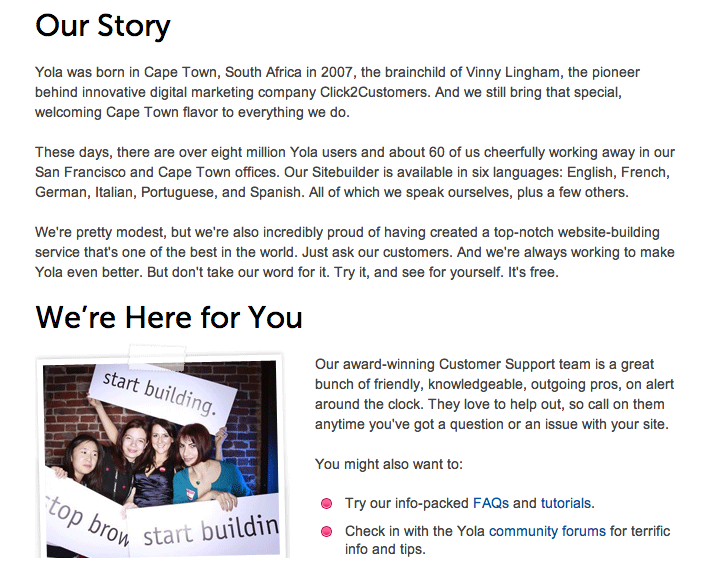BJ Fogg, a leading researcher on website credibility, says there are 4 types of credibility:
- Presumed credibility – General assumptions (e.g. A brand we’ve heard of is more credible, unknown brand is less.)
- Reputed credibility – Third party reference (e.g. Your wife said it’s good or your friends said service X is terrible.)
- Surface credibility – What we find on simple inspection (e.g. The website looks quality or “this is confusing.”)
- Earned credibility – Personal experience (e.g. Friendly customer service or text full of typos and factual errors.)
Based on these, here are five questions to ask yourself to see whether your vistors see your website as credible:
1. Does your website look professional?
First impressions last, and unfortunately your website visitors will judge your business in 90 seconds or less. This is why it is extremely important to pay attention to the design and aesthetics of your website.
Make sure your website looks clean and the layout is clear. The typography used should be easy to read. We recommend using professional images that will make your website look more polished.
The colors used on your website are also extremely important and brand colors can have a huge effect on how a visitor feels when they land on your website. Also pay attention to the content and navigation, these are two very important factors that make up a good website.
Finally, make sure you spell check your website. Poor spelling and grammar makes a bad impression, especially if your website is promoting copywriting and proofreading services!
The points above just skim the surface of good web design. There are many more do’s and don’ts of website building, which you should take into account when building your site or redesigning it.

Chef Jacob’s Yola Website Makeover Before and After
2. Do you demonstrate that you’re a real organization?
The most simple way to demonstrate this is by adding your address and contact information to your website. This will instantly show visitors that you are a real organization and not a faceless website.
Visitors will feel more comfortable dealing with your organization, if they know they can contact you easily by phone or email – even if they don’t at first. Contact information will go along way to boosting your long-term credibility.
We recommend, taking this a step further however, and encourage anyone building a website to add a ‘About Us’ page that outlines the history of the organization, as well as details of any press you may have received or awards won. The more a visitor feels they know about your organization, the more trust they will have in it.

Photos and team bios are also a great thing to include on your website. They show that there are real people behind your website and business. Outlining their expertise in particular areas or by demonstrating that you’re an industry authority will also boost your credibility.

3. Do you make it easy to verify the information on your website?
When presenting any information on your website make sure to reference your source. Citing information will increase trust and show evidence that supports your claims. However, make sure your sources are credible, as you can lose credibility purely by association.
4. Do you update your site regularly?
Most importantly, make sure your contact information is up-to-date and opening hours are correct on your website. If you collect leads via a form or email address, make sure your form is working correctly and that your mailbox will accept incoming email.
Regularly “quality check” your website, making sure all the links on your site are working correctly and direct users to where you expect. Spell check your website and make sure all images are displaying correctly. The devil is in the details.
An out-of-date website can be really detrimental to your credibility. Incorrect information and broken functionality, shows a lack of attention to detail and will make a visitor wonder about the level of service they will receive from your organization.
5. Are you endorsed by any third parties?
You can tell your visitors how great your organization is; but if you are endorsed by a third party, you will reap greater rewards. A simple way to do this is by adding testimonials from real people to your website. A list of happy customers endorsing your organization will help to build trust with prospective customers and will also show that other people have purchased your product and/or services.
You can take this a step further and also feature case studies, which can go into more depth about the benefits of your service and will also provide the perfect opportunity to demonstrate your expertise.
If you have been featured by any websites or in any press, display this prominently on your website and link through to the article so your visitor can read it themselves.

Lastly, if there is an “authority” in your industry, approach them and ask them to endorse your services. This type of recommendation can go a long way in helping build your credibility. Building your connections online is monumental for expanding your reach.
Pingback: Look Like a Big Business in 4 Simple Steps | Yola
Pingback: Five Content Musts for Your Microbusinesses' Site Part 1 | Yola
Pingback: 6 Ways to Get Google and Yelp Reviews | Yola
Pingback: So You Have Site Traffic, Now What? | Yola
Pingback: Why a Custom Domain Is Important to Your Business | Yola
Pingback: How to Create Effective CTAs | Yola
Pingback: 5 Essentials For Business Consultant’s Website | Aemead.com
Pingback: Why your company can benefit from having a Twitter account | GO.CO Blog